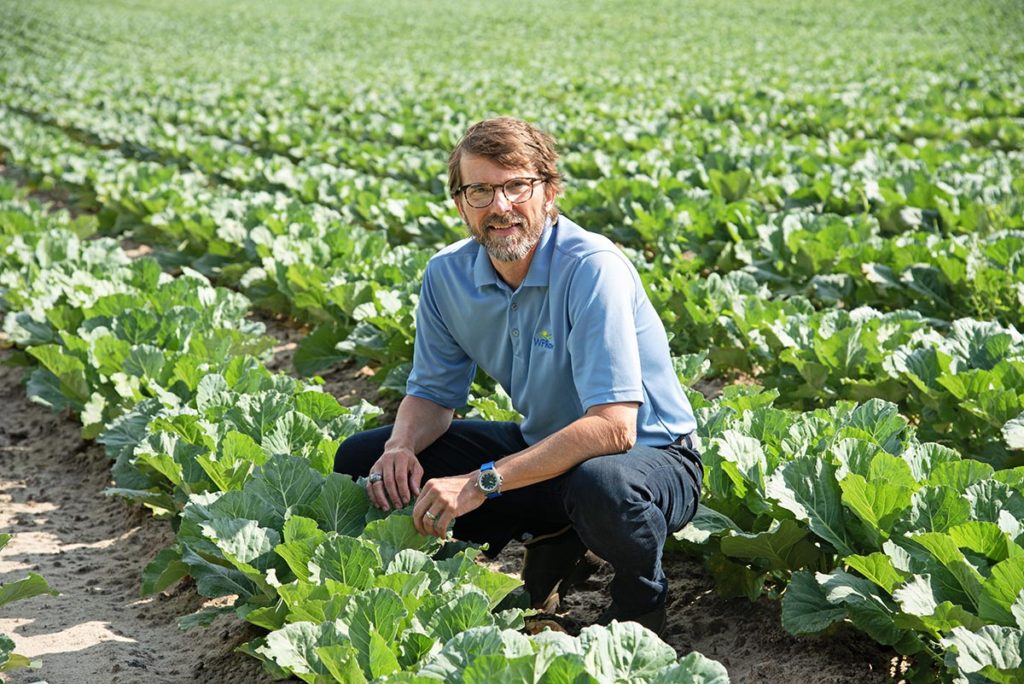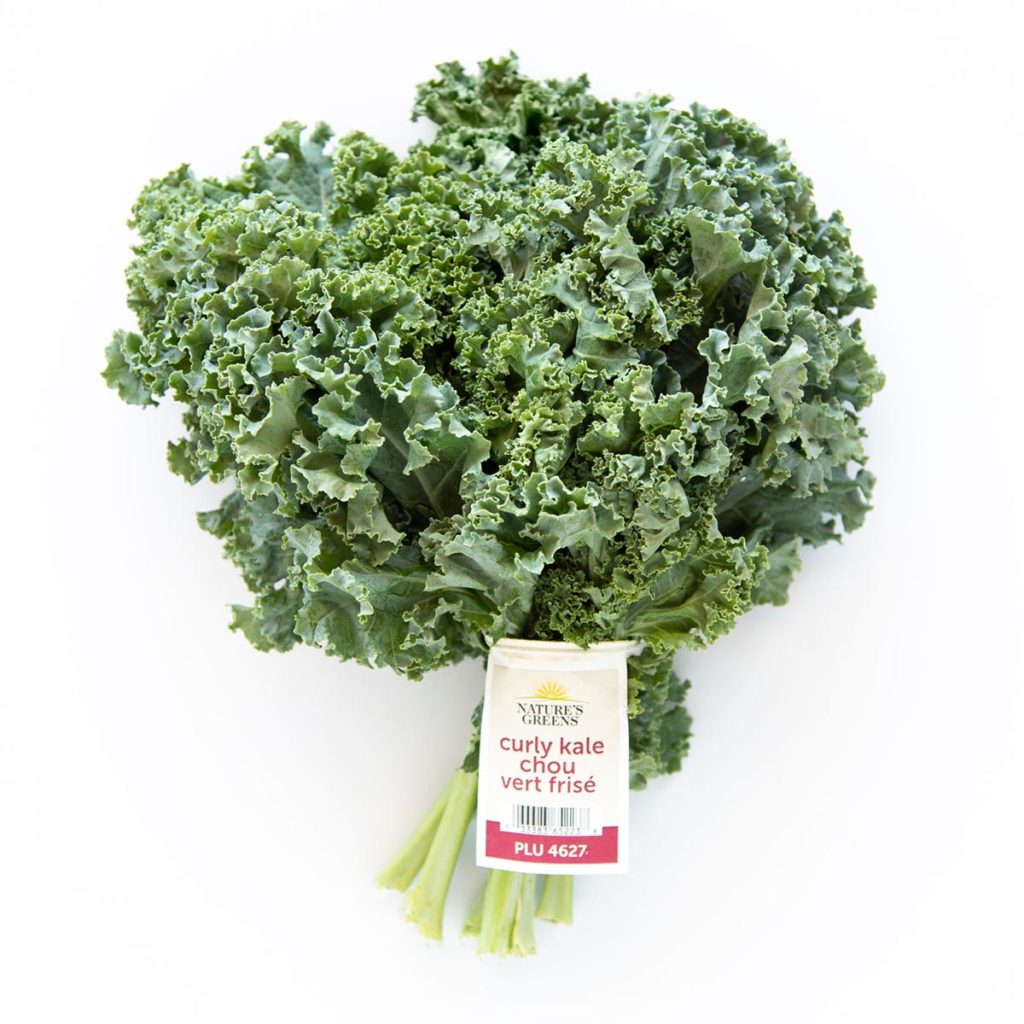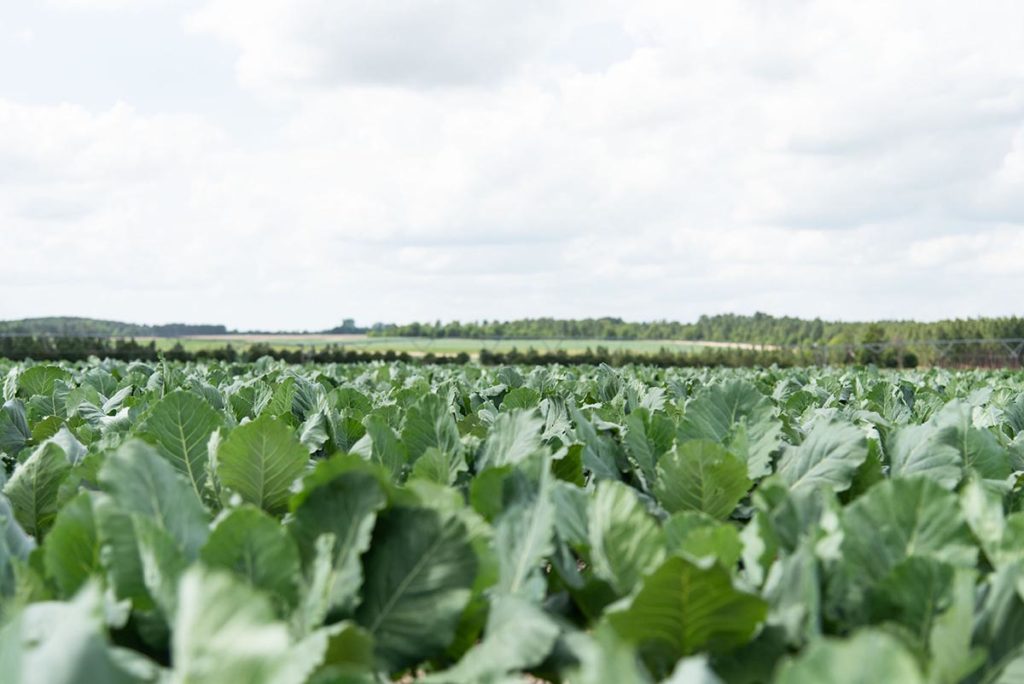By Clint Thompson
A family business born in 1925 is still thriving nearly 100 years later. When Walter and Ernestine Rawl planted their first cabbage on their wedding day, little did they realize it was the start of a successful business venture.
What started as a small planting in South Carolina has transformed into a major operation. WP Rawl, based in Pelion, now markets various fruits and vegetables from growing locations in multiple states.
The company’s secret to its almost 100 years of success is its willingness to adapt to an ever-changing economic climate. This has been vital to its sustainability.
“Every day is a new challenge,” says Ashley Rawl, third-generation family member and vice president of sales, marketing and product development. “You get out and go make it happen. Be willing to innovate and sometimes forget what you did the day before, or sometimes last week, and be willing to change. What we did that was great last week may not be great next week.

Photos courtesy of WP Rawl
“My uncle just passed in March. He was 92 but was still coming to the office three days a week. My dad still comes to the office every day. They’ve put a ton of blood, sweat and tears into this business.”
The earlier generations adapted to change even when it didn’t come naturally and was difficult. But good communication helped when change was needed, and it became part of the company’s formula for doing business.
PRODUCTION PROFILE
WP Rawl focuses largely on fresh vegetable production. It includes leafy greens, herbs, green onions and corn. Its history has also included a line of fresh cut vegetables, microwaveable butter items, a kale chip kit and salad kits.
WP Rawl’s growing regions cover South Carolina, Florida, Pennsylvania and Michigan. It has also partnered with growers in North Carolina, Virginia and New York. The business operates processing facilities in South Carolina and Florida. The company’s willingness to expand to other states has helped further its strategy of being a reliable source of produce year-round.
The growing demand from customers for year-round product led WP Rawl to examine and expand its operations, while remaining focused on its core growing areas in South Carolina and Florida. The expansion of the company enabled WP Rawl to reach retail chains in more than 30 states from Florida to Maine and into the Midwest. Before their partner farmers plant their crops, they are guaranteed a set amount of purchases per week. WP Rawl gets more diverse during the summer months with more growing locations.


CHALLENGING LABOR LANDSCAPE
As successful and sustainable as WP Rawl has been over the years, it has not been immune to the challenges and regulations that have forced many of its farming brethren out of business. The current labor landscape has been especially tough to navigate. Many of WP Rawl’s contracts were configured years in advance, so they didn’t account for the massive pay increase that was recently instituted through the adverse effect wage rate (AEWR).
“Where it gets really difficult are the regulations and H-2A labor,” says Rawl. “We’re getting 10 days or two weeks’ notice of a 15% pay rate increase. We’ve got contracts, hundreds of team members scheduled to come, and then the pay rate changes pretty much overnight.
“With some customers, we’re priced two years out. Coming out of COVID, a lot of them were considerate with price concessions, but it’s tough to keep going back to the well every time the Department of Labor changes the wage rate or makes a new ruling. Now they’re determining what level (type of job) is paid at what rate. That’s really been a game changer. We’re not a super high-margin business, so when you start talking a $10 or $12 price change on some workers, it’s hard.”
Rawl says the company employs an average of 180 to 250 H-2A workers year-round, including about 200 in South Carolina in the spring. Between 200 and 240 are hired in Florida from January to April.
The company has adjusted what commodities it produces. The costs to produce some crops did not justify their continuance. This was a major change in the last five years when the company stopped its production of squash and zucchini.
“They were a great summer crop but required a lot of resources like fertilizer, labor and packaging that made them difficult to sustain,” Rawl says. “As a company, we made the decision to focus more on our year-round core items.”
TECH SOLUTIONS
Rawl is always thinking about the future and how to remain sustainable for the next 100 years. Innovations and technological advancements are needed to navigate an AEWR that is increasing every year and input costs that remain high amid the current inflationary period.
“We’re always working on new projects to help move us forward as a company. Innovation is one of our core values. We recently upgraded our processing equipment and added optical sorters that help sort the good and damaged leaves as they move along the lines in our processing facility,” Rawl says. “We have tested and are working with harvesting aids and automatic harvesters to hopefully one day limit the amount of hand harvests that have to be done at the field level.”
Automated harvesting could be a game changer. It would significantly decrease labor needs, but machines needs to be configured to not bruise the crops.
“We should soon have an automated green onion harvester coming out of Europe that’s going to pull the green onions out of the ground for us and deliver them on a belt. We went and looked at it four or five years ago in Europe. Finally, the economics and return on investment make a lot of sense now. We’re going to begin testing the machine in July,” he says.

FOCUS ON FUTURE AND FAMILY
Being future focused has helped JP Rawl stay sustainable when other agricultural entities have been forced out of business. What does the future look like for WP Rawl?
Family members will likely still be heavily invested in the business. Currently, there are 11 family members, second to fourth generation, who work for the company. The family will continue adapting to the changing environments and economic landscapes that likely will stand in its way.
“It’s not going to be easy, but I definitely think there’s a future in farming. I do think fresh fruits and vegetables hold a key to the healthcare equation in this country,” Rawl says. “Farmers that grow like items (same crop categories) are going to have to work together to help drive down one another’s costs.
“Being a farmer, you almost have to be an optimist — sometimes to a fault. We grow, pack and process some of the most nutrient-dense items that there are. There are countries around the world that are grasping to try to feed their people nutrient-dense products. We have it right here under our noses in this country. We cannot let that slip away from us.”









